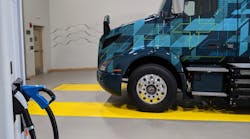Electrification: How much progress can we expect in the next 10 years?
Electric trucks could be found almost everywhere as 2019 came to a close. In recent months, numerous battery-electric or hydrogen fuel cell models were unveiled at media events, displayed at industry conferences, and demonstrated at ports and other venues.
However, what should not be lost in all the hype is just how few real-world models exist. That is likely to change dramatically over the next 10 years, if the predictions from some of the industry’s leading experts are correct.
Eaton Corp., for example, projects that by 2030 battery electrics will account for 30% of light-duty commercial vehicles globally, 7% of medium-duty vehicles, as much as 6% of heavy-duty trucks, and 40% of buses.
“I’m convinced in the next 10 to 15 years, one-third of our trucks and buses will have alternative drivetrains. And most of those will be fully electric,” said Andres Renschler, CEO of Traton Group.
Speaking at the North American Commercial Vehicle (NACV) show, Renschler said his company, which owns about 17% of Navistar, is investing 1 billion euros into its e-mobility division.
Blake Moret, chairman and CEO of Rockwell Automation, was even more bullish in a television interview with CNBC.
He said within 20 years, electric passenger cars, trucks, and buses “could easily be the majority of vehicles on the road.”
What about clean diesel?
Though the electric buzz is unmistakable, it does not change the fact that “diesel remains the overwhelmingly dominant technology in long haul trucking, powering 97% of Class 8 big-rig trucks in the United States,” according to the Diesel Technology Forum.
The group’s report from late 2019 found that more than 43% of Classes 3-8 vehicles are model-year 2011 or newer — considered the newest-generation of clean diesel technology.
“As we look to the future where new fuels and technologies may come more into focus, we can’t hit the pause button on progress today,” said Allen Schaeffer, executive director of the Diesel Technology Forum.
The federal government’s Phase 2 greenhouse gas rule will require these vehicles to be even cleaner and more fuel efficient. The next phases of the rule are scheduled to take effect in 2021, 2024 and 2027.
It was requiring suppliers such as Eaton, Meritor, Dana, Jacobs Vehicle Systems, and others to develop new systems, such as cylinder deactivation technology, which can increase exhaust temperature while reducing emissions.
The Diesel Technology Forum estimates that by 2030, clean diesel trucks are projected to cut 1.3 billion tons of carbon dioxide emissions, 73 million tons of nitrogen oxide emissions, and 4 million tons of particulate matter. These vehicles will also save 130 billion gallons of diesel and 33.1 billion barrels of crude oil.
Continue to part 2: For fleets, electric trucks will raise more operational challenges.



